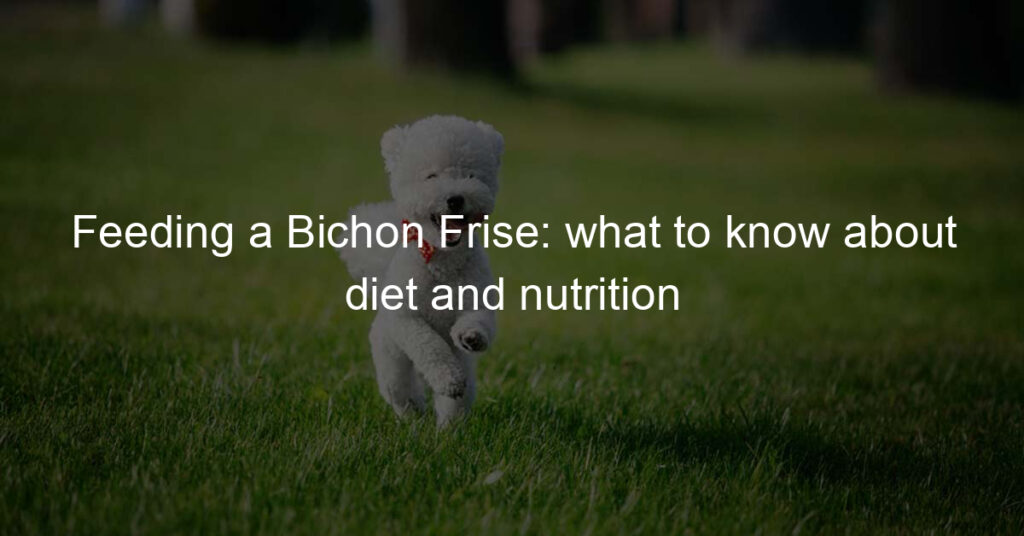If you’re the proud owner of a Bichon Frise, congratulations on having one of the most loyal and loving canine companions! One important aspect to consider when it comes to caring for your furry friend is making sure their diet is healthy and adequate. If you are not sure how to provide your pup with proper nutrition, this blog post can help!
Here we’ll go over foods that are best for a Bichon Frise in terms of both hunger satisfaction and overall health, as well as key aspects related to feeding such as portion size and timing. Read on for tips every pet parent should know about feeding a bichon frise!
How do I keep my Bichon Frise healthy?
Keeping a Bichon Frise healthy is a great way to give your pup the longest and happiest life possible. The best way to do this is by providing them with regular exercise and high-quality nutrition. Make sure that you walk them for at least 30 minutes every day, in addition to giving them plenty of playtimes in your yard or at the dog park.
When it comes to their diet, opt for food specifically designed for their size and coat needs, while avoiding any unhealthy treats or table scraps. Additionally, make sure they have an annual checkup with their vet, as well as any necessary vaccinations and parasite preventatives. With just a few simple steps, you can ensure that your furry friend stays happy and healthy!
What food is best for a Bichon Frise?
A Bichon Frise has unique nutritional needs, just like any other pet. To keep your furry friend in good health and with a beautiful coat, premium dry dog food is the ideal choice. Look for kibble with high-quality protein, healthy carbohydrates, and essential vitamins and minerals that are specially formulated for small breeds.
As with all dog breeds, it’s important to remember that your Bichon Frise may have individual tastes or preferences. Offering them different flavors of kibble from time to time could make mealtime exciting. Treats are also great rewards, but be careful not to overindulge as too many unhealthy snacks can lead to weight gain. With these easy steps, you’ll have the perfect diet plan for your loyal companion.
What fruits are best for Bichon Frise?
If you’ve got a Bichon Frise as a part of your family, you know just how cute and special they are! They deserve the very best treatment, and in this case, fresh fruit. Apples, pears, strawberries, and blueberries are all fruits that Bichon Frise loves!
You can offer them as treats from time to time, or even chop them into their food for even more variety. Keep in mind though not to over-treat your pup; too much sugary fruit flavor can lead to an upset stomach or worse. Following the veterinarian-recommended portion sizes is key to keeping your pup healthy and happy!
What should I not feed my Bichon Frise?
As a Bichon Frise owner, it’s essential to plan your pup’s meals and snacks carefully. You should not feed them, people, food, especially foods high in fat or anything high in sugar, like chocolate. Also avoid human vitamin supplements, as they are too strong for a dog’s body. Bones can be dangerous because they can get stuck in the small intestine and cause blockages so these should be avoided.
Even some of the new pet diets on the market have not been tested on dogs yet, so it’s best to exercise caution until more extensive testing has been done. Take note of any foods your pup may be allergic to; look out for excessive scratching and ear infections that do not clear up with simple ointments. With all these factors in mind, you’ll be able to create a menu for your four-legged companion that meets all their nutritional needs!
What are Bichons allergic to?
Just like humans and other pets, Bichons can suffer from allergies. Common allergens that might affect your Bichon include pollen, dust mites, mold, food ingredients, and flea bites. Some may also react to certain fabrics or shampoos.
Knowing what your furry friend is allergic to can be tricky – take the time to observe and note any changes in their behavior after coming into contact with a potential allergen. If you think they are having an allergic reaction, it’s best to consult with your veterinarian right away for proper diagnosis and treatment.
Conclusion
Feeding a Bichon Frise: what to know about diet and nutrition
Whether you are a first-time Bichon Frise parent or an experienced one, feeding your pup is always a priority. Your pup’s diet and nutrition play a major role in their health and well-being — so it’s important to choose your pup’s meal plan wisely.
Quality foods with the proper balance of proteins, fats, carbohydrates, vitamins, and minerals will help sustain their energy levels while keeping them looking and feeling their best. While seeking out the right premium food for your pup might seem daunting at first, educating yourself on their dietary needs will go a long way in the long run.
With that knowledge comes the confidence of knowing you are providing your pet with everything they need nutritionally to lead a happy and healthy life!








